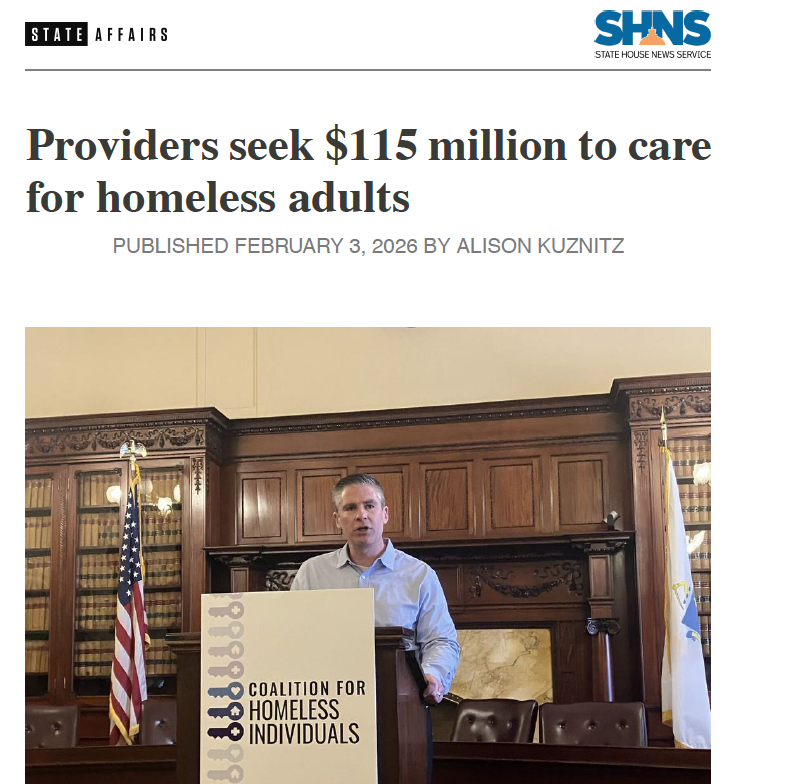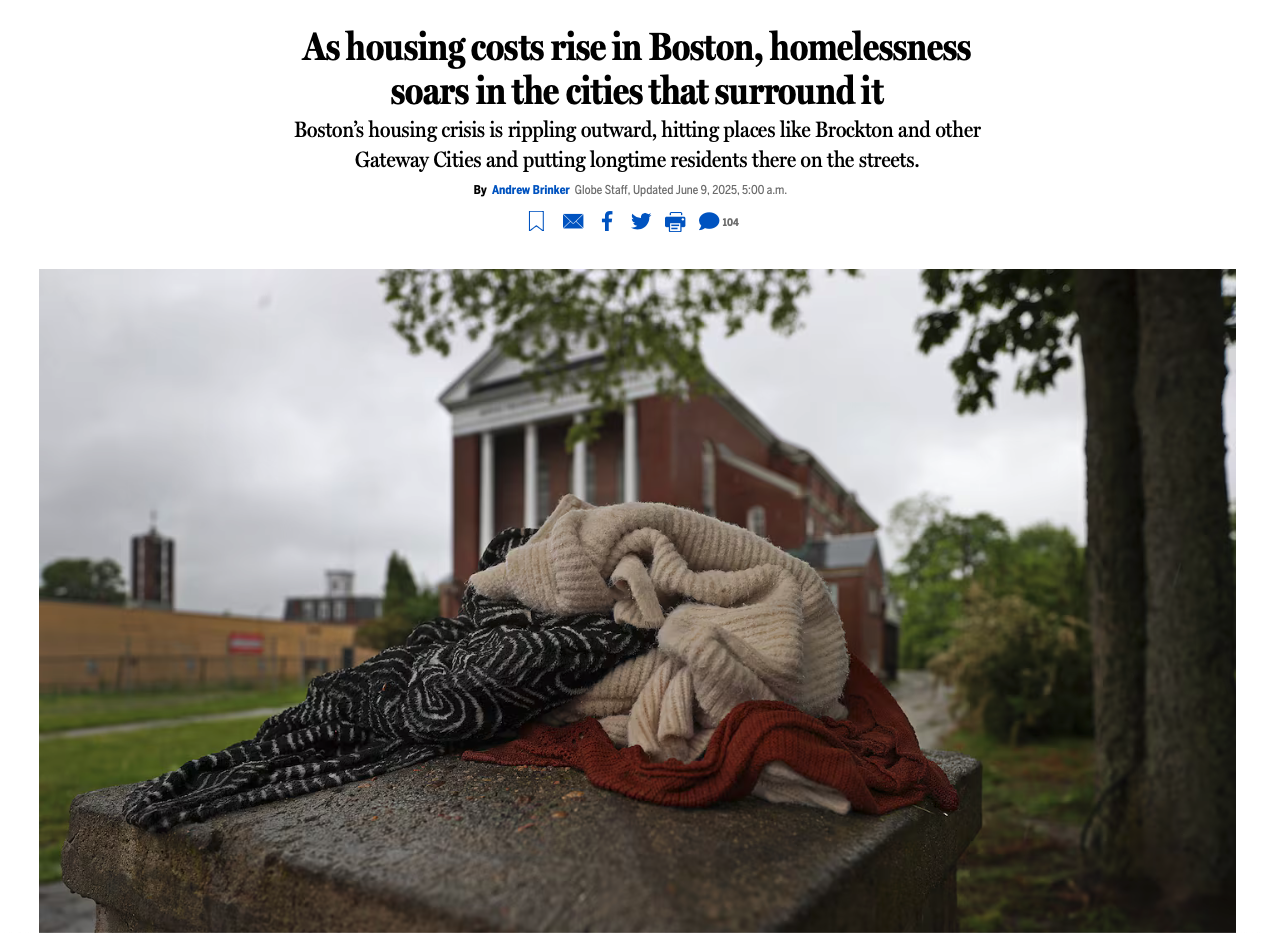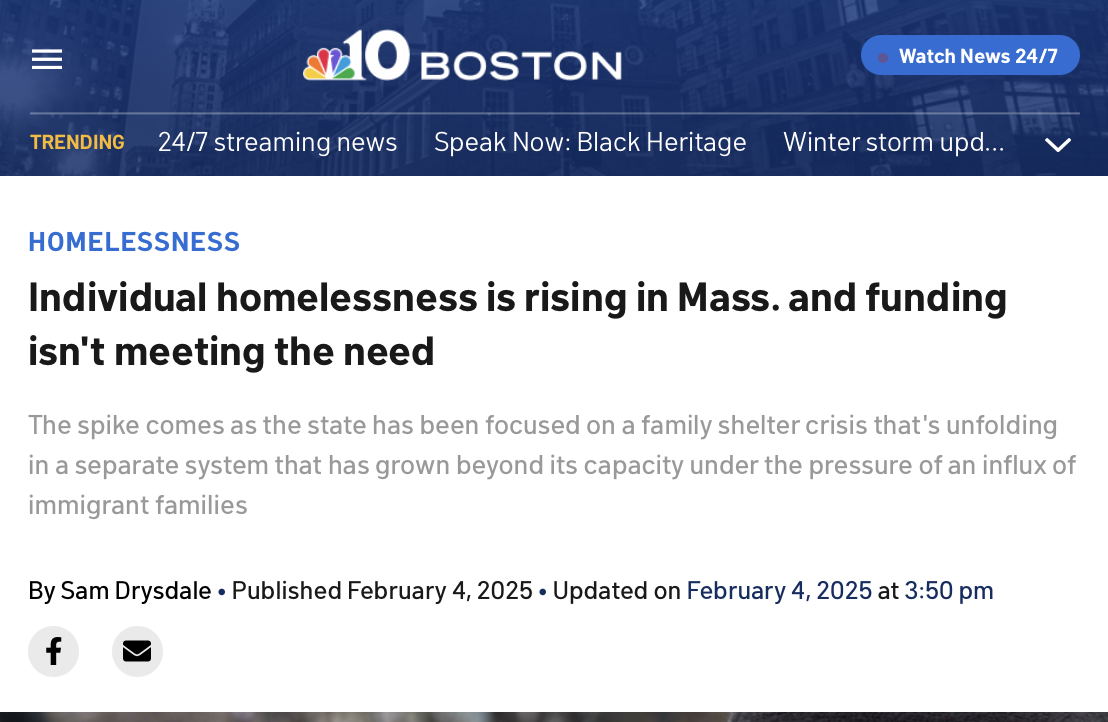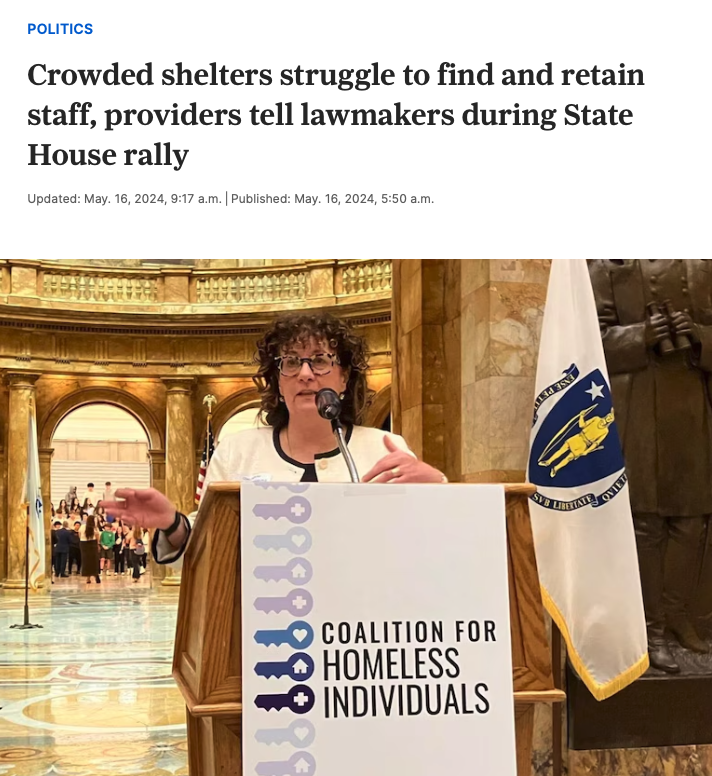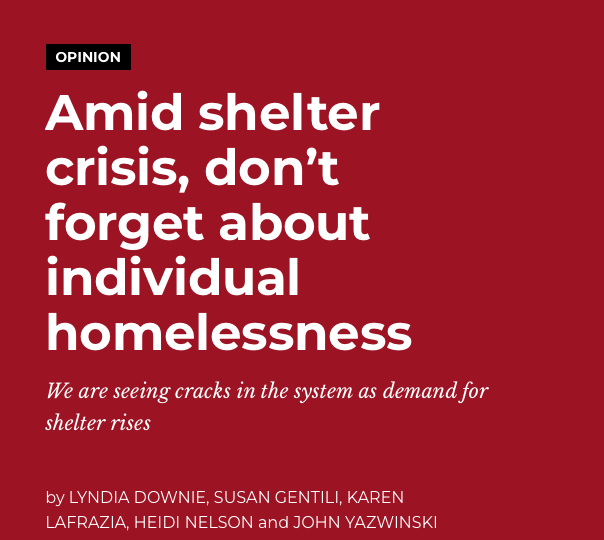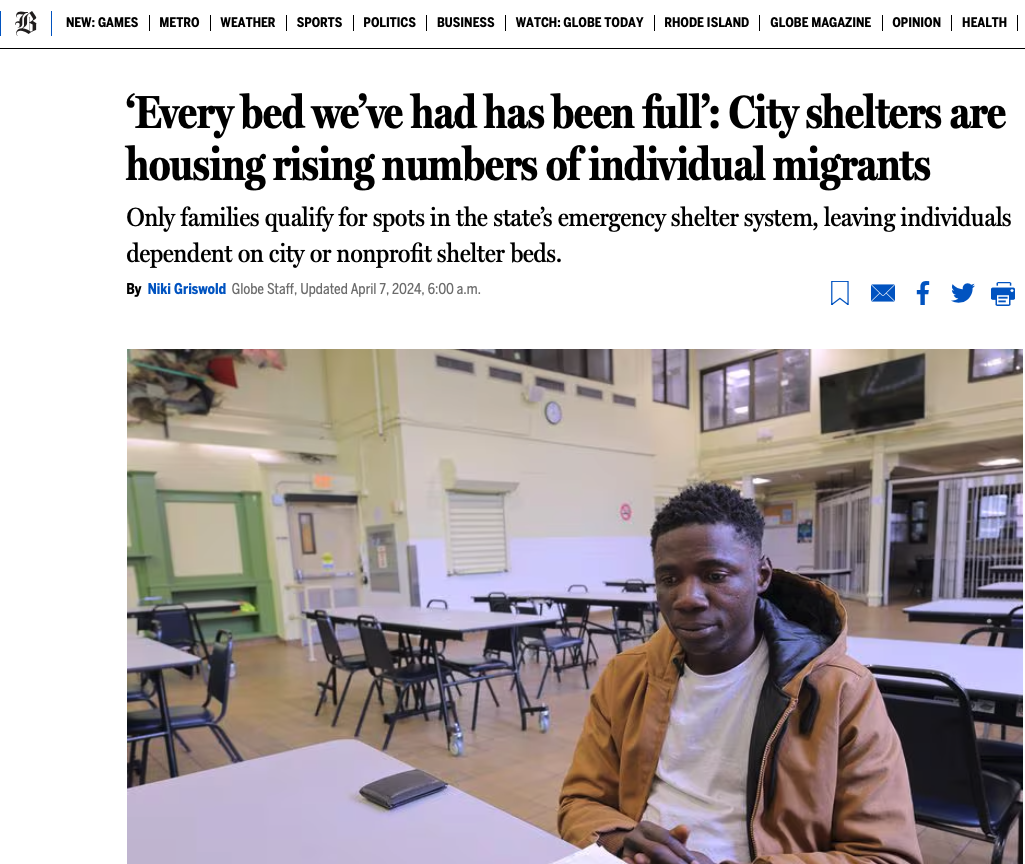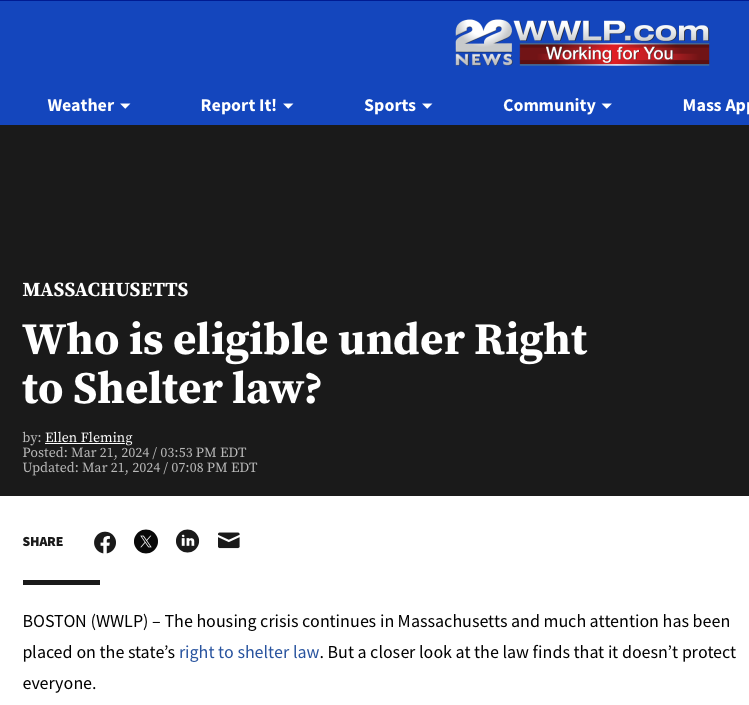Providers seek $115 million to care for homeless adults
"The number of folks living outside in our neighborhoods has increased. The visibility of those people outside in our community has grown exponentially," Libby said. "Our population is getting older and struggling with complex medical issues."
As housing costs rise in Boston, homelessness soars in the cities that surround it
“To some extent, homeless people have always existed in places like Brockton. But what’s happening now is different.”
Coalition for Homeless Individuals calls for budget funding
“‘This year, the numbers are out of control,’” said Jane Banks, Assistant Secretary of Housing and Community Development. ‘In Greenfield, we have 45 beds, and we served 74 people for 2,441 bed nights.’”
PRESS RELEASE
Wednesday, February 26, 2025
BOSTON, MA–The Coalition for Homeless Individuals (CHI) held its annual Lobby Day at the Massachusetts State House on Wednesday, February 26. More than 110 advocates descended upon Beacon Hill to meet with their lawmakers about the need for more funding to serve individuals experiencing homelessness in Massachusetts.
The individual shelter system is entirely separate from the family emergency shelter system. Individuals–defined as an adult with no children–are not covered under the state’s right to shelter law, and providers are not funded through a centralized state system. Instead, a vast network of providers across the state have created a flexible safety net that includes shelter, transitional services, and supportive housing, funded through a mix of private and state funding.
Thanks to critical state funding, Massachusetts is a leader in the fight to end homelessness with among the lowest number of unsheltered homeless in the nation, according to the U.S. Department of Housing and Urban Development (HUD). Moreover, the vast majority of individuals are homeless for only a short time. According to internal numbers shared by CHI service providers, about 90% of individuals experiencing homelessness in Massachusetts are homeless for less than a year, and only 10% are chronically homeless.
Despite this strong system, extreme demand has pushed providers beyond capacity. Cities and towns across the state are reporting growing numbers of homeless encampments. According to HUD’s most recent Annual Homeless Assessment Report from June 2024, communities across Massachusetts saw up to a 25% increase in demand for shelter, services and housing over the past year. This past summer, many providers reported demand numbers typically only seen during the coldest winter months. Massachusetts is currently experiencing the highest rates of individual homelessness since 2007, when HUD began officially tracking homelessness in the U.S.
“The Coalition for Homeless Individuals and its members provide a lifeline to people experiencing homelessness,” said Massachusetts Secretary of Housing and Livable Communities Ed Augustus. “The Healey-Driscoll administration is proud to prioritize the Housing First model and to support the creation of new affordable and supportive housing across the state. Shelter is a temporary stop on the journey back to a permanent home, and together we can ensure that Massachusetts is a place where every person has a place to call home.”
“You are all examples that the system does work when it’s funded, when it’s respected, and when you see people as individuals and not just part of a machine,” said State Senator Lydia Edwards (D-3rd Suffolk). “Today, the CHI is representing the thousands of people who cannot tell their own stories. I am blessed to have worked on the front lines my entire career and I am grateful for their front line advocacy and leadership.”
“I’m here today in support of the providers who do the work of sheltering, delivering services, and finding a path back to housing for people experiencing homelessness. I’m here in support of the guests and clients of those providers who have come here today to advocate directly for their own needs. And of course, I’m here today on behalf of my district, which is home to some of the biggest service providers in the state,” said State Representative John F. Moran (D-9th Suffolk). “The work these providers do is not optional and benefits everyone. People in Massachusetts are in need, and in growing numbers. Without the providers here today, those people would be out on the streets–sleeping in our doorways, on our sidewalks, on our park benches. The demand for services has grown so significantly in the last few years, we now need to rethink how we resource it.”
“We are not the family shelter system,” said Isaiah Stephens, Managing Director of the Lowell Transitional Living Center. “But we have built a system that works. Between emergency shelter, wraparound services, and referrals to permanent supportive housing, our system is strong. We are keeping people off the streets better than most other parts of the country. But this year, we saw demand over the summer that we typically only see in winter months and that demand has only grown this Fall and Winter. There is a real need out there, and we need more resources to meet that need.”
“We are at capacity every single night,” said Jane Banks, Vice President of Housing & Homeless Services at Clinical Support Options (CSO) in Western Massachusetts. “We are seeing unprecedented demand for shelter and support for individuals. We’re supporting people who are aging in our shelter systems, we are seeing an increase of encampments, lack of access to affordable housing, elders sleeping in cars and other places not meant for habitation. When our system is under-funded, or even level-funded, it becomes increasingly impossible to keep up with the demand.”
The extreme demand for individual shelter in Massachusetts can be attributed to a perfect storm of factors, including:
lack of affordable rental units
a large aging population
increased rates of domestic violence
the end of Covid-era housing and health policies
the ongoing substance misuse epidemic
an influx immigrants fleeing violence and natural disaster across the globe
Through its advocacy, the CHI is requesting additional funding for service providers that support individual homeless populations. Two line items in the upcoming state budget are of particular importance:
7004-0102 which provides funding for individual homeless provider programs to run emergency shelter, job training, transition programs, and supportive housing. The current stress and demand on the system drive the need for increased funding.
7004-0109 which was initiated by the legislature in FY23 and provides funding for workforce development, to help with recruitment and retention of employees. Providers struggle to hire and keep good staff because of the physical and emotional nature of the work, particularly with demand so high.
##
Coalition for Homeless Individuals holds briefing at State House
“One shelter director says we already have the tools we need to permanently end homelessness in Massachusetts, such as the shelter system, medical care organizations for homeless individuals, and job training programs.
‘It works! This approach works! We don’t need to figure out how to end homelessness. We need to resource it,’ said President and CEO of St. Francis House of Karen LaFrazia.”
Individual homelessness is rising in Mass. and funding isn't meeting the need
“Communities across Massachusetts have seen up to a 25% increase in individuals experiencing homelessness in the past year, according to U.S. Department of Housing estimates from June.”
Health-Related Social Needs Integration Funds Awarded to CHI Members
December 24, 2024
MassHealth
The Healey/Driscoll administration has awarded $10 million through the Health-Related Social Needs (HRSN) Integration Fund to 37 organizations to support the delivery of housing and nutrition support services to MassHealth members across the state.
Congratulations to all the awardees, including CHI members SMOC, Project Bread, Central MA Housing Alliance, Center for Human Development, and Boston Healthcare for the Homeless. The funds will support enhanced technology, improve the ability to collaborate with ACOs in the new managed care framework, and support organizations becoming the “parent” of a hub.

